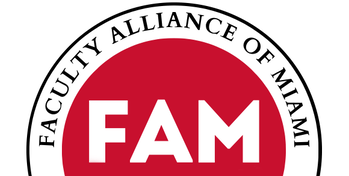A situation of grave concern to Miami faculty, staff, and students is currently unfolding on campus. Two Miami professors are under threat of what we believe to be unfair and unnecessary termination, and a staff member has been forced to resign. Please support your colleagues by signing our petition to Miami leadership.
Last fall, the administration was notified that a plant of scientific and cultural interest growing in The Conservatory at Hamilton was supposedly a “Schedule I” controlled substance. The university’s response has been out of proportion to any possible offense.
For alleged, disputed violations of the university’s drug policy (more on this below), Dan Gladish and John Cinnamon, two valued senior faculty members, were suspended with pay and barred from campus and from contact with students, disrupting their students’ education and especially the progress of Gladish’s graduate students. They were informed that their tenure would be revoked and that their contracts would not be renewed.
Gladish’s appeal to the Committee on Faculty Rights and Responsibilities will be reviewed in the fall. Cinnamon is currently on medical leave, but his case will be taken up when he returns. Brian Grubb, the manager of the conservatory, has resigned under pressure of termination. If the professors’ appeals are not successful, they, too, will soon lose their jobs.
We understand that the details of their case (condensed here) will be debated by the Faculty Rights and Responsibilities Committee and by lawyers for the faculty members and the university. By making this statement, we do not attempt to substitute our judgement on legal matters for theirs. We do, however, feel that there was a rush to apply the harshest possible penalties to actions that have harmed no one.
The plant in question, Tabernanthe iboga, is used in traditional West African religious ceremonies studied by Cinnamon, associate professor of anthropology. More than a decade ago, he gave seeds to The Conservatory. The plant has been part of the collection for many years without incident (and is also to be found in the collections of other universities and public gardens, including University of Colorado, University of California–Davis, the New York Botanical Garden, Ohio State [formerly], Smith College [formerly], and elsewhere).* Last summer, some surplus seedlings were taken home by a student worker (with permission of the manager). This was reported to Dean Cathy Bishop-Clark, who called the Miami police, who called the DEA. An investigation was conducted, but no arrests were made or charges filed. Despite that, the manager was forced to resign, the student was suspended, and two professors face termination.
Violations of the Drug-Free Workplace Act are a serious matter that could result in the revocation of federal contracts, and Miami has many millions of dollars’ worth of them. Cautionary action would be understandable. But no “drugs” were found on campus in this case—only a plant of cultural and scientific interest grown for educational purposes at multiple other institutions. A product of the mature root bark of the iboga plant, ibogaine, is on the DEA’s list of Schedule I substances, but whether the Tabernanthe iboga plant counts as a controlled substance is unclear. Even if ibogaine had been found, the Drug-Free Workplace Act does not require termination of the employees involved.
Miami’s administration has gone far beyond what is required of it by law. The plant’s presence harmed no one—until the administration got involved. UC Davis conservatory director Ernesto Sandoval has called the terminations “a disservice to students.” In his view, “to fire [the professors and the conservatory manager] as a result of one plant in the collection meant to inspire and educate students is, in my opinion, a serious overreaction towards people whose life goal is to further the cause of knowledge in general and plant science in particular.”
While it is incumbent upon us as faculty to resist policies that threaten to erode academic freedom, we do not see this as merely a matter of self-interest. The removal of the Director and Manager of The Conservatory threatens the survival of a valuable collection and the loss of years of institutional knowledge. Furthermore, it is an insult to the generous donor who worked with Professor Gladish to make The Conservatory a reality.
The case raises serious questions about the direction of Miami University. The apparent willingness to squander its own resources—dedicated and respected faculty, the well-being of students, a collection of scientific value, and community goodwill—does not inspire confidence.If you are troubled by these unfair decisions to terminate faculty and staff, please sign our petition requesting that they be reinstated.
*Correction:
Correction: Both University of Connecticut and the US Botanical Gardens have informed us that their attempts to propagate Tabernanthe iboga failed and that they do not currently have the plant in their collections. We have removed them from this list and are grateful for the correction from their collections managers (7/6/2019).


Leave a Reply